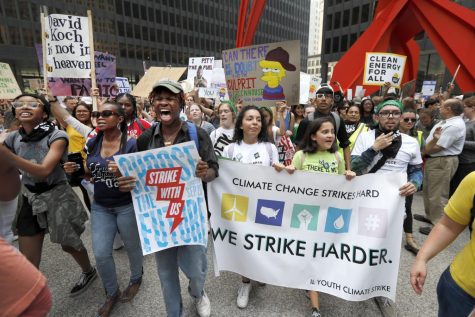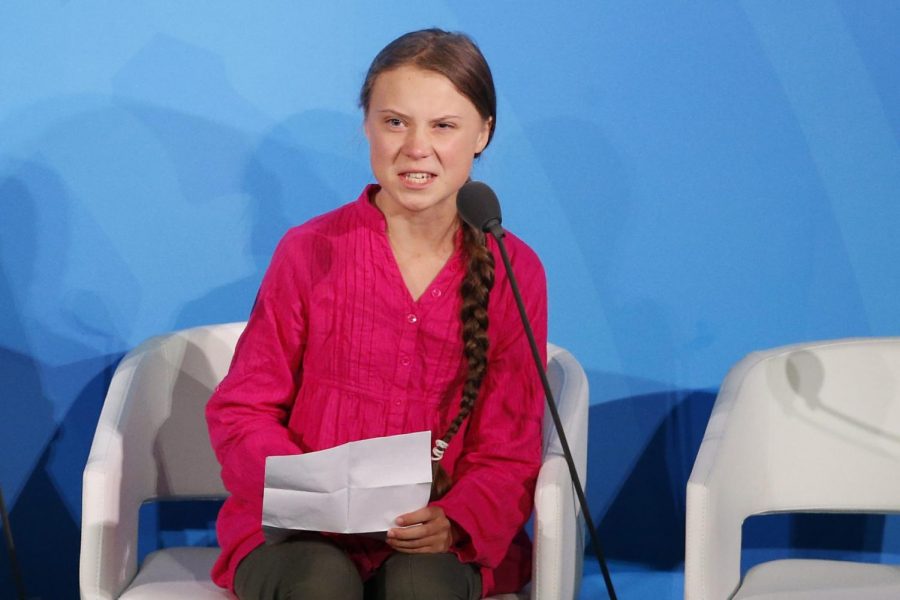Young people take center stage at UN climate summit
Environmental activist Greta Thunberg, of Sweden, addresses the Climate Action Summit
Coming off the heels of global protests Sept. 20, world leaders from more than 70 countries gathered in New York this past Monday to discuss stricter climate policy at the U.N. Climate Summit.
Autumn Peltier, Greta Thunberg, Mari Copeny and Xiye Bastida were among 15 youth activists who filed a complaint to the U.N., citing violations to children’s rights under the U.N. Committee on the Rights of the Child. The complaint said under the Committee, leaders should be taking action to protect future generations from the devastating impact of climate change.
Swedish teen activist Thunberg gave an impassioned speech criticizing leaders for their inaction on the crisis before the summit began.
“People are suffering,” she said. “People are dying. Entire ecosystems are collapsing. We are in the beginning of a mass extinction and all you can talk about is money and fairy tales of eternal economic growth. How dare you!”
During the summit, leaders from around the world gave three- to four-minute speeches pledging their goals for fighting climate change, though the United States was notably absent.
U.N. officials reported that the United States did not request to speak at the summit. The White House pool reported that President Donald Trump made a 14-minute appearance — listening to Angela Merkle’s speech — and left without speaking.
Tyler Barron, policy fellow at the Environmental Law and Policy Center (ELPC), a Midwest-based public interest environmental legal advocacy group, said while this reflects the government’s “step back from progress and towards progressive polluting policies,” it should not discourage citizens.
Referencing the United States leaving the Paris Climate Accord in 2017, Barron said the move “violated the will of the people” who want to take action against the crisis.

Protesters rally on the Federal Plaza inside the Loop during a global climate change march Friday, Sept. 20, 2019, in Chicago.
“Many cities that had made commitments in that accord to drastically reduce their carbon consumption stepped up and said, ‘We’re going to keep these commitments,” Barron said.
137 cities have already committed to transitioning to 100 percent clean and renewable energy as part of the Sierra’s Club “Ready for 100” campaign.
Joshua Sarnoff, a DePaul law professor, said the summit addressed inadequacies of current global policies to combat the crisis.
“The Climate Summit clearly demonstrated increasing recognition by most of the countries of the world of the inadequacy of existing legal commitments to greenhouse gas emission reductions and to financing the needed changes to energy production, distribution and utilization that will help us to avoid what will obviously be increasingly catastrophic effects of climate change,” Sarnoff said.
One of the most striking claims of the summit came from Chilean President Sebastian Pinera Echenique, who said 66 countries have pledged to be more ambitious with climate policy goals — with 30 swearing to be carbon neutral by midcentury.
Although it may seem like an idealistic promise, Barron said reducing carbon emissions is achievable if world governments take action now.
“There’s no question at all that they can do it right now,” Barron said. “The technology is there, pricing is there, all of that is doable. I think the problem with it is that those 60 countries only make up something like 17 percent of the total carbon emissions, but I think where the value lies is that these countries can now serve as a benchmark to smaller communities within larger polluting nations to take action.” (According to a New York Times analysis of data from the Global Carbon Project, the 66 countries only account for 11 percent of global carbon emissions.
Samantha Arechiga, a DePaul sophomore and representative for the Chicago chapter of the International Indigenous Youth Council, said systemic change — specifically addressing structures of capitalism and colonialism — is necessary to combat climate change.
“Those are the systems that are perpetuating climate change because these systems rely on us neglecting our relationship with the Earth and viewing it as something that is a resource and can be exploited,” Arechiga said.
Arechiga, who gave a speech on behalf of her organization at the Chicago strike Sept. 20, came away frustrated by her experience. She said she noticed a “co-opting” and “whitewashing”of the movement amongst those in attendance and was irritated by the idea that voting is a viable solution to the crisis.
“You’re putting a band-aid on a bullet wound whenever you want to say that voting is going to fix climate change,” Arechiga said. “That’s not going to fix climate change. What’s going to fix climate change is literally the rewiring of the way that society is functioning right now.”
Hailey Halcomb, a DePaul junior who attended the Sept. 20 climate strike and saw Arechiga speak, said she agrees that systemic change and social justice deserve a place in the broader climate discussion.
“Our conversations about the climate crisis must include an analysis of capitalism, colonialism and the acknowledgement and justice for indigenous communities who are disproportionately affected by climate change despite protecting 80 percent of the world’s biodiversity,” Halcomb said.
Georgina Stacy Quintana, a DePaul junior studying political science and Latin American and Latino studies, said the media also fails to effectively address underlying causes.
“Since the media corresponds directly with capitalistic states and wants to sell their papers, there is a lack of accountability,” Quintana said. “People want to believe that they could save Madre Tierra with metal straws while drinking out of plastic cups. This is merely a distraction and an opportunity for companies to market.”
The ELPC’s Barron said the “fatalistic” approach to most climate reporting contributes to a lack of public understanding of the true causes of climate change.
“It’s very easy to write about climate change, or carbon consumption in this very ‘sky is falling’ way,” he said. “You should never write about the negative aspects or the amount of the possible side effects without proposing effective solutions in the same breath.”
Barron said the trend has been noticeable since the start of “new wave climate activism” in 2006 with former vice president Al Gore’s documentary, “An Inconvenient Truth,” which, in his view, was not comprehensive enough.
“I think where he really failed in a lot of ways was to prioritize human consumption as the way to reduce carbon consumption,” he said. “So, adjusting personal behavior rather than pressuring corporations and governments to act on a large scale.”
According to a 2017 study from the U.K.-based Carbon Disclosure Project, 100 energy companies are responsible for 71 percent of all industrial emissions.
“You could do that for your entire life,” he said, referencing stereotypical ways to reduce one’s carbon footprint. “And it would not make a single drop in the overall emissions of companies like Amazon, Google and these palm oil companies—places like those.”
Barron said that ahead of the next U.N. conference on climate change, scheduled for Dec. 2-13 in Santiago, Chile, the youth activists present a compelling message.
“They’re not asking for anyone to listen to them,” Barron said. “They’re asking for everyone to listen to the science. I think that’s why their message is really effective because they’re not up there grandstanding for themselves, right? They’re up there grandstanding and pointing the finger at the people who should be responsible for creating these solutions.”
EDITORS NOTE (Oct. 5): This article has been edited to clarify the context of Halcomb’s quote in response to Arechiga’s speech; to clarify Arechiga’s description of fellow protesters “whitewashing” the climate movement and her year in school; and correct the spelling of the name “Georgina”







